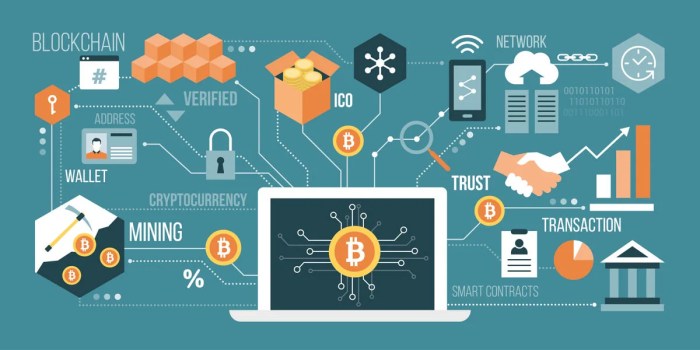Kicking off with Crypto and the Future of Technology, get ready to dive into how cryptocurrencies like Bitcoin are shaking up the tech industry, integrating blockchain technology, and shaping the future of new technologies. It’s about to get real futuristic, folks!
The Impact of Crypto on Technology

Cryptocurrencies like Bitcoin are causing a major shift in the technology industry, revolutionizing the way we think about financial transactions and data security.
Blockchain technology, the backbone of most cryptocurrencies, is being integrated into various tech sectors such as supply chain management, healthcare, and voting systems. This decentralized and secure system allows for transparent and tamper-proof record-keeping, leading to increased efficiency and trust in these industries.
The potential future implications of crypto on the development of new technologies are vast. With the rise of decentralized finance (DeFi) applications and smart contracts, we could see a future where financial services are accessible to anyone with an internet connection, eliminating the need for traditional banks. Additionally, the use of blockchain technology in IoT devices could lead to enhanced security and interoperability, creating a more connected and efficient world.
Integration of Blockchain in Supply Chain Management
Blockchain technology is revolutionizing supply chain management by providing a transparent and immutable record of every stage of the supply chain process. This allows for increased traceability, accountability, and efficiency in tracking products from manufacturer to consumer.
- Blockchain technology ensures that product information, such as origin, authenticity, and quality, is securely stored and can be easily verified by all parties involved.
- Smart contracts within blockchain can automate processes such as payments, quality control, and compliance, reducing the need for intermediaries and streamlining operations.
- By implementing blockchain in supply chains, companies can detect and prevent fraud, reduce counterfeiting, and improve overall trust and transparency in the industry.
Crypto and Data Security
Cryptocurrencies play a crucial role in ensuring secure transactions and protecting sensitive data in the digital landscape. The innovative technology behind cryptocurrencies, such as blockchain, offers robust security features that set them apart from traditional data storage methods.
Security Features of Blockchain Technology
- Decentralization: Blockchain operates on a decentralized network, making it resistant to hacking attempts or single-point failures.
- Immutability: Once data is recorded on the blockchain, it cannot be altered or tampered with, ensuring the integrity of transactions.
- Cryptographic Hash Functions: Blockchain uses cryptographic hash functions to secure data, providing a high level of encryption and protection.
Role of Cryptography in Safeguarding Digital Assets
- Cryptography plays a vital role in securing digital assets within the crypto ecosystem by encrypting sensitive information and ensuring confidentiality.
- Public and Private Keys: Cryptography enables the use of public and private keys to authenticate users and authorize transactions securely.
- End-to-End Encryption: Cryptographic techniques like end-to-end encryption help protect communication and data exchanges, safeguarding user privacy.
Decentralization and Innovation: Crypto And The Future Of Technology

Decentralization in cryptocurrencies is a key driver of innovation in technology. By removing the need for centralized authorities like banks or governments to verify transactions, decentralized systems enable a more efficient and secure way of transferring value.
Decentralized Applications (dApps) and Their Impact
Decentralized applications, or dApps, are software applications that run on a decentralized network of computers, rather than a single server. These dApps leverage blockchain technology to provide users with secure, transparent, and censorship-resistant services. Examples of popular dApps include:
- Uniswap: A decentralized exchange that allows users to trade cryptocurrencies directly from their wallets without the need for an intermediary.
- MakerDAO: A decentralized lending platform that enables users to borrow and lend cryptocurrencies using smart contracts.
- Decentraland: A virtual reality platform where users can buy, sell, and build on virtual land using the native cryptocurrency, MANA.
These dApps are revolutionizing the tech landscape by offering new possibilities for financial services, gaming, social networking, and more, all while maintaining user privacy and security.
Advantages and Challenges of Decentralized Systems
Decentralized systems have several advantages, including:
- Security: Decentralized networks are less susceptible to hacking or data breaches due to their distributed nature.
- Transparency: Transactions on decentralized networks are publicly recorded on the blockchain, providing transparency and accountability.
- Censorship resistance: Decentralized systems are immune to censorship or shutdown by a single entity, ensuring freedom of access and expression.
However, decentralized systems also face challenges, such as scalability issues, regulatory uncertainty, and user experience limitations. Overcoming these challenges will be crucial in shaping the future of technology and unlocking the full potential of decentralized innovation.
Smart Contracts and Automation

Smart contracts have revolutionized business processes by introducing automation in various industries. These self-executing contracts are written in code and automatically enforce the terms agreed upon by parties.
Transforming Business Processes
- Smart contracts streamline operations by automating tasks that were previously manual, saving time and reducing human error.
- They eliminate the need for intermediaries, reducing costs and increasing efficiency in transactions.
- Smart contracts ensure transparency and accuracy in record-keeping, enhancing trust between parties.
Reducing Costs in Tech Companies, Crypto and the Future of Technology
- By automating processes through smart contracts, tech companies can cut down on operational expenses and optimize resource allocation.
- These contracts enable real-time tracking of transactions, reducing delays and improving overall performance.
- Smart contracts also enhance security measures, protecting sensitive data and preventing fraud.
Fostering Trust and Efficiency
- Smart contracts promote trust among parties by ensuring that agreements are executed as intended without the need for third-party intervention.
- They enhance efficiency by streamlining complex processes and enabling faster decision-making.
- Through automation, smart contracts contribute to the advancement of technological innovations and create a more secure digital environment.


